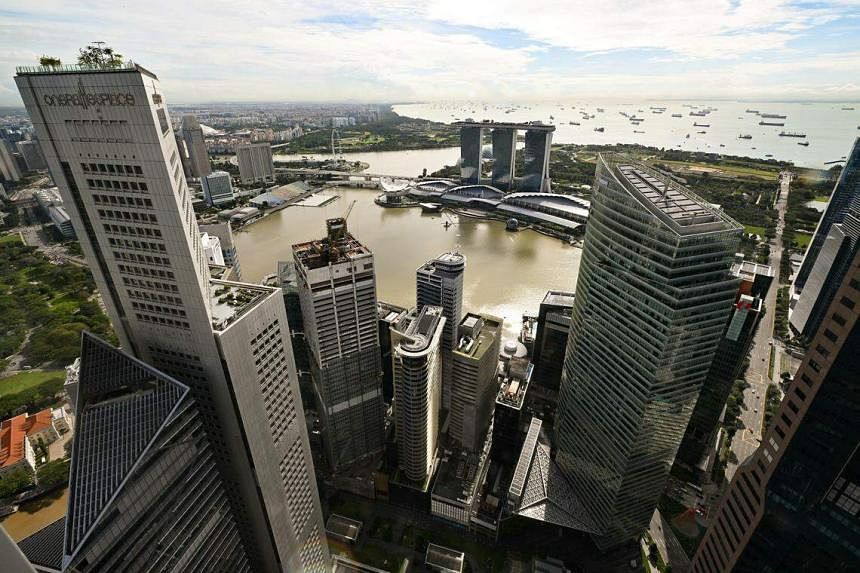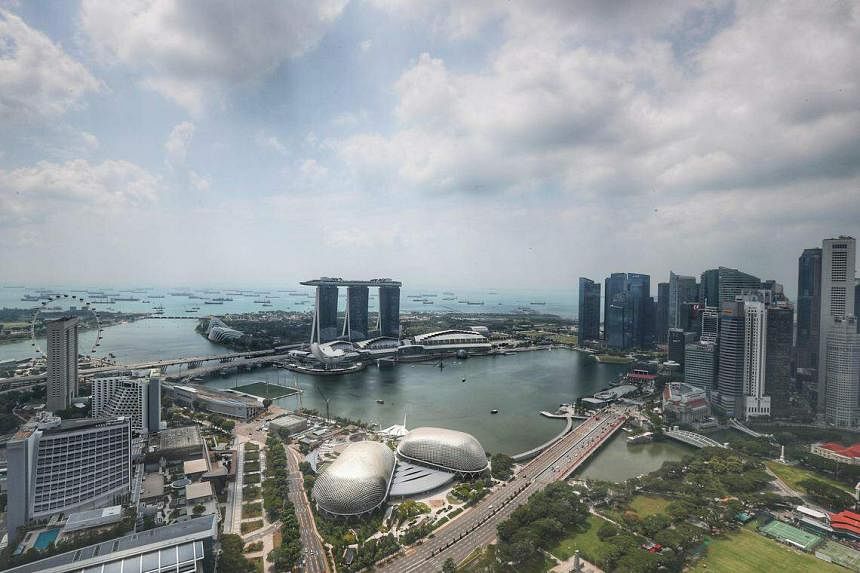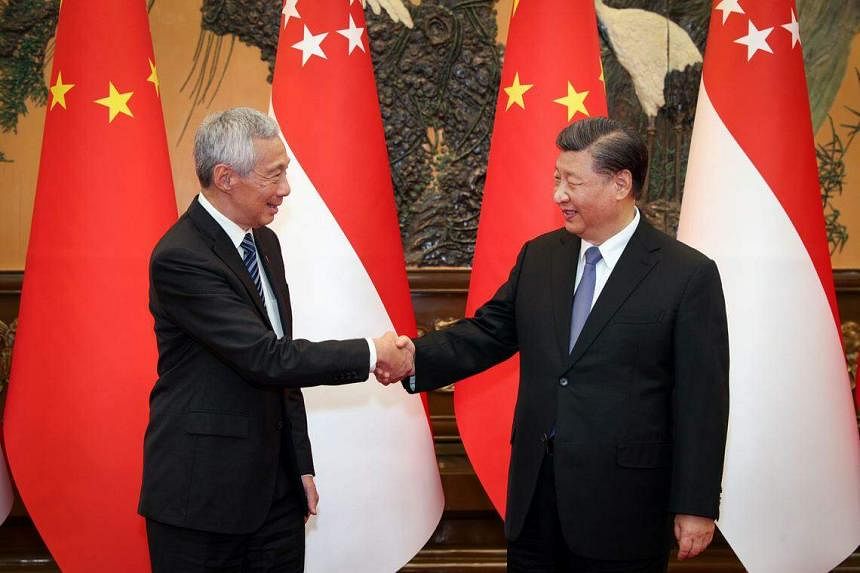Singapore asks banks to keep quiet on wealth inflows during China boom
Singapore asks banks to keep quiet on wealth inflows during China boom Tacit directive from regulators comes as wealthy Chinese people funnel funds into city-state Singapore has worked to position itself as a neutral territory between the US and China © Lauryn Ishak/Bloomberg Singapore asks banks to keep quiet on wealth inflows during China boom on twitter (opens in a new window) Singapore asks banks to keep quiet on wealth inflows during China boom on facebook (opens in a new window) Singapore asks banks to keep quiet on wealth inflows during China boom on linkedin (opens in a new window) Singapore asks banks to keep quiet on wealth inflows during China boom on whatsapp (opens in a new window) Save Mercedes Ruehl in Singapore, Kaye Wiggins in Hong Kong and Leo Lewis in Tokyo 7 HOURS AGO
Singapore has asked the world’s biggest banks to avoid discussing the origins of the significant sums of money flowing into the city over the past year, as wealthy Chinese funnel billions into the Asian financial hub.
The tacit directive from the Monetary Authority of Singapore was given during a February 20 meeting of an industry group made up of bankers and regulators, according to multiple people who attended.
The flow from China into Singapore has become a politically sensitive issue domestically, and the MAS wants banks to keep public discussion of the phenomenon to a minimum, said three people with knowledge of the talks. China was not mentioned by name, but it was clear regulators were referring to the country, they added.
The influx of mainland Chinese money and people into Singapore comes as China’s president Xi Jinping has launched a regulatory assault on business and an anti-corruption crackdown. The city-state has plotted a careful path as a neutral financial centre at a time of rising tension between Beijing and Washington, becoming a destination for the assets of many of China’s wealthiest families.
“It was obvious that they [the MAS] were referring to China with all the press about family offices setting up here and mainlanders moving over, though they didn’t single out a particular country,” said one banker from an international bank.
Members of the Private Banking Industry Group include HSBC, Standard Chartered, UBS, BNP Paribas, JPMorgan and Citigroup, as well as local banks DBS and Bank of Singapore. It is jointly chaired by representatives of the MAS and UBS and meets three times a year.
The MAS, Singapore’s central bank, said when banks reported the sources of their inflows, they should not single out any particular markets, according to another senior banker briefed on the discussion.
This banker summarised the MAS’s message as being that private banks should “just quietly do your job” because “you don’t want to antagonise”.
The MAS said the meeting in February noted that growth in fund flows into Singapore “has been driven by high net worth individuals from different regions”.
One banker said it was not the first time the MAS has used the forum to address large capital inflows from a particular market. In the past, booming Indonesian wealth — and the local scrutiny it attracted — concerned regulators.
“They desperately want to be the regional hub of private banking, and the situation has kind of granted them that wish,” said the banker. “[The Chinese flows] are probably overrunning their best expectations of what was going to happen.”
Lawyers and industry groups estimate Singapore had 1,500 family offices by the end of last year, with a large chunk of them from China. The MAS said there were 700 family offices at the end of 2021, up from a handful in 2018.
Singapore has been eager to use financial regulation and government policy to maximise the appeal of its financial services industry and attract wealth, said one private banker briefed by a colleague on the February 20 meeting.
However, it is acutely aware of the potential for domestic pushback against the influx of Chinese money and how it could widen Singapore’s income gap, already a political pressure point given the rising cost of living and soaring rents.
“The Chinese presence is being felt everywhere,” said one industry group executive in the asset management industry. “It is not just super yachts and luxury cars anymore, it is being percolated down to everyday people and it is a topic of conversation across all layers of Singapore society.
“We haven’t been told explicitly not to talk about” China, the executive added, “but there is a sense in the financial services industry that talking about it publicly will not be welcomed.”
https://www.ft.com/content/ea198ae9-7157-4e3c-9832-2db4cf93d1c2
Singapore asks banks to keep quiet on wealth inflows during China boom Tacit directive from regulators comes as wealthy Chinese people funnel funds into city-state Singapore has worked to position itself as a neutral territory between the US and China © Lauryn Ishak/Bloomberg Singapore asks banks to keep quiet on wealth inflows during China boom on twitter (opens in a new window) Singapore asks banks to keep quiet on wealth inflows during China boom on facebook (opens in a new window) Singapore asks banks to keep quiet on wealth inflows during China boom on linkedin (opens in a new window) Singapore asks banks to keep quiet on wealth inflows during China boom on whatsapp (opens in a new window) Save Mercedes Ruehl in Singapore, Kaye Wiggins in Hong Kong and Leo Lewis in Tokyo 7 HOURS AGO
Singapore has asked the world’s biggest banks to avoid discussing the origins of the significant sums of money flowing into the city over the past year, as wealthy Chinese funnel billions into the Asian financial hub.
The tacit directive from the Monetary Authority of Singapore was given during a February 20 meeting of an industry group made up of bankers and regulators, according to multiple people who attended.
The flow from China into Singapore has become a politically sensitive issue domestically, and the MAS wants banks to keep public discussion of the phenomenon to a minimum, said three people with knowledge of the talks. China was not mentioned by name, but it was clear regulators were referring to the country, they added.
The influx of mainland Chinese money and people into Singapore comes as China’s president Xi Jinping has launched a regulatory assault on business and an anti-corruption crackdown. The city-state has plotted a careful path as a neutral financial centre at a time of rising tension between Beijing and Washington, becoming a destination for the assets of many of China’s wealthiest families.
“It was obvious that they [the MAS] were referring to China with all the press about family offices setting up here and mainlanders moving over, though they didn’t single out a particular country,” said one banker from an international bank.
Members of the Private Banking Industry Group include HSBC, Standard Chartered, UBS, BNP Paribas, JPMorgan and Citigroup, as well as local banks DBS and Bank of Singapore. It is jointly chaired by representatives of the MAS and UBS and meets three times a year.
The MAS, Singapore’s central bank, said when banks reported the sources of their inflows, they should not single out any particular markets, according to another senior banker briefed on the discussion.
This banker summarised the MAS’s message as being that private banks should “just quietly do your job” because “you don’t want to antagonise”.
The MAS said the meeting in February noted that growth in fund flows into Singapore “has been driven by high net worth individuals from different regions”.
One banker said it was not the first time the MAS has used the forum to address large capital inflows from a particular market. In the past, booming Indonesian wealth — and the local scrutiny it attracted — concerned regulators.
“They desperately want to be the regional hub of private banking, and the situation has kind of granted them that wish,” said the banker. “[The Chinese flows] are probably overrunning their best expectations of what was going to happen.”
Lawyers and industry groups estimate Singapore had 1,500 family offices by the end of last year, with a large chunk of them from China. The MAS said there were 700 family offices at the end of 2021, up from a handful in 2018.
Singapore has been eager to use financial regulation and government policy to maximise the appeal of its financial services industry and attract wealth, said one private banker briefed by a colleague on the February 20 meeting.
However, it is acutely aware of the potential for domestic pushback against the influx of Chinese money and how it could widen Singapore’s income gap, already a political pressure point given the rising cost of living and soaring rents.
“The Chinese presence is being felt everywhere,” said one industry group executive in the asset management industry. “It is not just super yachts and luxury cars anymore, it is being percolated down to everyday people and it is a topic of conversation across all layers of Singapore society.
“We haven’t been told explicitly not to talk about” China, the executive added, “but there is a sense in the financial services industry that talking about it publicly will not be welcomed.”
https://www.ft.com/content/ea198ae9-7157-4e3c-9832-2db4cf93d1c2











